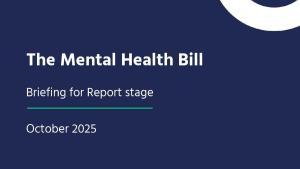As Children’s Commissioner, it is my greatest privilege to listen to children and to amplify their voices on the issues that matter most to them — both those that affect them directly, and those that may appear, at first glance, to lie beyond their immediate experience.
At the heart of my role, as defined in legislation, is a responsibility to promote and protect the rights of children, and to ensure their views are not only heard, but acted upon. Over the last four years, I have engaged with one million children and young people about the issues that are important to them. One 12-year-old girl living in hospital told me: “[The government] should consider our thoughts. What they decide dictates our future.”
It is therefore deeply concerning to me whenever legislation that affects children’s lives passes through Parliament without taking their views and opinions into consideration.
Such is the case for the Assisted Dying Bill.[1]
The Bill currently before Parliament seeks to legalise assisted dying for terminally ill adults or adults living with life-limiting conditions. Though the proposed legislation applies only to those over the age of 18, its implications for children — especially those nearing legal adulthood — are undeniable.
If passed, the Bill will mean that, for the first time, medical professionals will be able to discuss the concept of assisted dying with young people deemed competent who are approaching their 18th birthday, as well as the possible choices that would become available to them as they reach this milestone of adulthood.
Despite the significance of this potential legislative change, children have not been consulted on it at any stage.
One of the areas children and their parents or carers consistently raise with me is the difficulties of navigating life with additional needs or disabilities, including those for whom childhood will be their whole life, who will never grow up into adults. Families describe a system that is complex, slow, and often adversarial. A system that they must fight, rather than one that fights for them.
I recently established a panel of young people to consider the wide-ranging issues encountered by children living with additional needs and what provision should look like for them. In one of their most recent sessions, this group of young people – joined by two of my Youth Ambassadors – had a wide-ranging conversation about the Assisted Dying Bill.
The views shared by these young people are deeply personal. They do not speak for every child — nor should they have to. Their views, like adults, are nuanced and diverse that take inspiration from their own life experiences and circumstances – but their deep consensus was that whatever their view, they must be engaged in this debate, one of the most profound moral and philosophical debates of a generation.
I absolutely agree. It is essential to listen, to reflect, and to ensure that policy and law-making does not overlook the perspective of those they will one day impact. Whether or not a child would, on turning 18, become within scope of the Assisted Dying Bill’s proposals, whether it would allow a family member to end their own life and leave them without adequate support in their grief, or whether it fosters a belief in a child that their life somehow has less value than others because of their condition – all their voices deserve to be heard as part of this conversation.
Since taking up the role of Children’s Commissioner in 2021, I have been clear about the urgent need to reform how we support children with disabilities, and with life-limiting or life-shortening conditions. I have continued to raise these issues at the highest levels of government.
Many people have rightly highlighted concerns about the potential pressures such legislation could place on disabled people, and the message it might send about whose lives are considered worth living, fostering a sense that some lives have ‘less’ value than others. As the young people taking part in this discussion agreed, the focus on policy conversations must also be about supporting people to live, not just to die.
Children experience the world differently from adults – but they understand the inherent inequality and risk in allowing judgements to be made about the value of one life over another. They are developing their identities and views, doing so while navigating systems that are not designed with them in mind, and asking questions that require honest, respectful answers.
On matters of such profound moral and ethical importance, their insights are not just valuable — they are essential.
This paper captures some of what they said.
[1] UK Parliament, Terminally Ill Adults (End of Life) Bill, Link, accessed April 2025.




